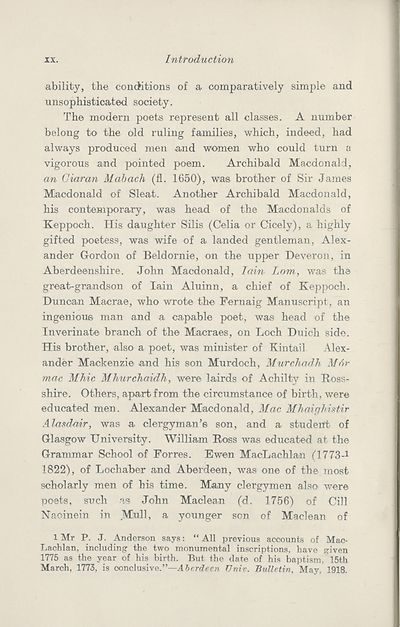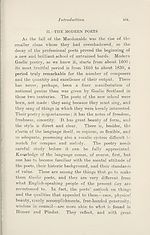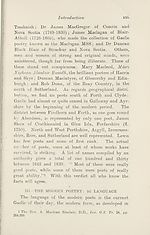Download files
Complete book:
Individual page:
Thumbnail gallery: Grid view | List view

XX.
Introduction
ability, the conditions of a comparatively simple and
unsophisticated society.
The modern poets represent all classes. A number
belong to the old ruling families, which, indeed, had
always produced men and women who could turn a
vigorous and pointed poem. Archibald Macdonald,
an Giaran Mabach (fl. 1650), was brother of Sir James
Macdonald of Sleat. Another Archibald Macdonald,
his contemporary, was head of the Macdonalds of
Keppoch. His daughter Silis (Celia or Cicely), a highly
gifted poetess, was wife of a landed gentleman, Alex¬
ander Gordon of Beldornie, on the upper Deveron, in
Aberdeenshire. John Macdonald, Iain Lom, was the
great-grandson of lain Aluinn, a chief of Keppoch.
Duncan Macrae, who wrote the Fernaig Manuscript, an
ingenious man and a capable poet, was head of the
Inverinate branch of the Macraes, on Loch Duich side.
His brother, also a poet, was minister of Kintail Alex¬
ander Mackenzie and his son Murdoch, Murchadh MAr
mac Mhic Mhurchaidh, were lairds of Achilty in Ross-
shire. Others, apart from the circumstance of birth, were
educated men. Alexander Macdonald, Mac Mhaighistir
Alasdmr, was a clergyman’s son, and a student of
Glasgow University. William Ross was educated at the
Grammar School of Forres. Ewen MacLachlan (1773-1
1822), of Lochaber and Aberdeen, was one of the most
scholarly men of his time. Many clergymen also were
poets, such as John Maclean (d. 1756) of Cill
Naoinein in Mull, a younger son of Maclean of
1 Mr P. J. Anderson says: “ All previous accounts of Mac¬
Lachlan, including the two monumental inscriptions, have given
1775 as the year of his birth. But the date of his baptism, 15th
March, 1773, is conclusive.”—A5cr<7eera TJniv. Bulletin, May, 1918.
Introduction
ability, the conditions of a comparatively simple and
unsophisticated society.
The modern poets represent all classes. A number
belong to the old ruling families, which, indeed, had
always produced men and women who could turn a
vigorous and pointed poem. Archibald Macdonald,
an Giaran Mabach (fl. 1650), was brother of Sir James
Macdonald of Sleat. Another Archibald Macdonald,
his contemporary, was head of the Macdonalds of
Keppoch. His daughter Silis (Celia or Cicely), a highly
gifted poetess, was wife of a landed gentleman, Alex¬
ander Gordon of Beldornie, on the upper Deveron, in
Aberdeenshire. John Macdonald, Iain Lom, was the
great-grandson of lain Aluinn, a chief of Keppoch.
Duncan Macrae, who wrote the Fernaig Manuscript, an
ingenious man and a capable poet, was head of the
Inverinate branch of the Macraes, on Loch Duich side.
His brother, also a poet, was minister of Kintail Alex¬
ander Mackenzie and his son Murdoch, Murchadh MAr
mac Mhic Mhurchaidh, were lairds of Achilty in Ross-
shire. Others, apart from the circumstance of birth, were
educated men. Alexander Macdonald, Mac Mhaighistir
Alasdmr, was a clergyman’s son, and a student of
Glasgow University. William Ross was educated at the
Grammar School of Forres. Ewen MacLachlan (1773-1
1822), of Lochaber and Aberdeen, was one of the most
scholarly men of his time. Many clergymen also were
poets, such as John Maclean (d. 1756) of Cill
Naoinein in Mull, a younger son of Maclean of
1 Mr P. J. Anderson says: “ All previous accounts of Mac¬
Lachlan, including the two monumental inscriptions, have given
1775 as the year of his birth. But the date of his baptism, 15th
March, 1773, is conclusive.”—A5cr<7eera TJniv. Bulletin, May, 1918.
Set display mode to:
![]() Universal Viewer |
Universal Viewer | ![]() Mirador |
Large image | Transcription
Mirador |
Large image | Transcription
| An Comunn Gàidhealach > An Comunn Gàidhealach Publications > Bàrdachd Ghàidhlig > (24) |
|---|
| Permanent URL | https://digital.nls.uk/126455306 |
|---|
| Description | This contains items published by An Comunn, which are not specifically Mòd-related. It includes journals, annual reports and corporate documents, policy statements, educational resources and published plays and literature. It is arranged alphabetically by title. |
|---|
| Description | A collection of over 400 items published by An Comunn Gàidhealach, the organisation which promotes Gaelic language and culture and organises the Royal National Mòd. Dating from 1891 up to the present day, the collection includes journals and newspapers, annual reports, educational materials, national Mòd programmes, published Mòd literature and music. |
|---|---|
| Additional NLS resources: |
|

